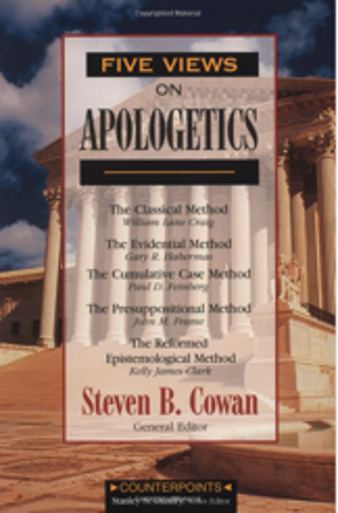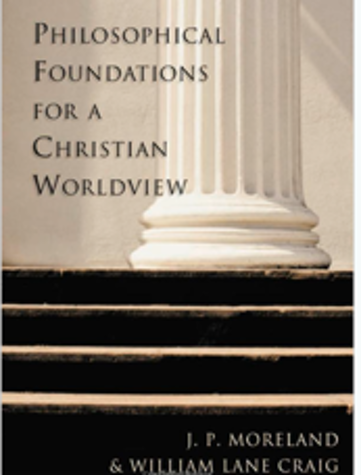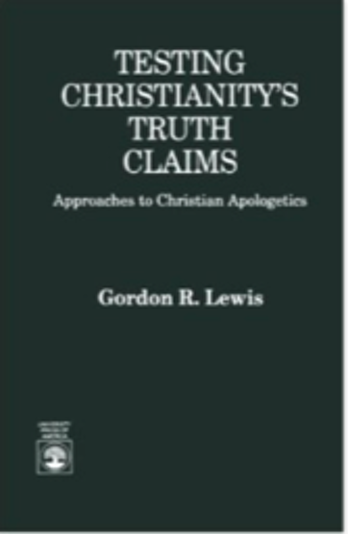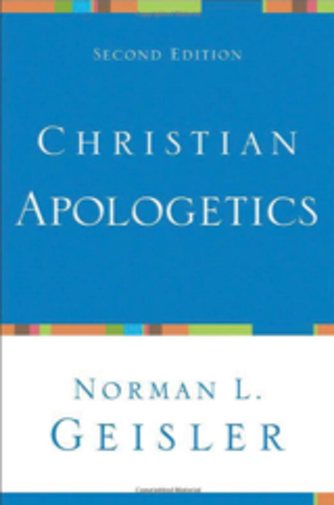
These reading resources are intended for Christian professors who are not professional philosophers or theologians but desire to get better in the apologetic enterprise in an academic setting.
A recommendation does not carry with it an endorsement of everything they have to say.
Selected Books
Listed in order of suggested reading
 Cowan, Steven B. & Gundry, Stanley N. eds. Five Views on Apologetics. Grand Rapids, MI: Zondervan, 2000. pps. 381.
Cowan, Steven B. & Gundry, Stanley N. eds. Five Views on Apologetics. Grand Rapids, MI: Zondervan, 2000. pps. 381.
Provides an opportunity to examine side by side five ways apologetics are “done,” including: The Classical Method, The Evidential Method, The Cummulative Case Method, The Presuppositional Method, and the Reformed Epistemological Method. A great starting point for understanding systems of apologetics.
Each section is written by a proponent of a different view of apologetics and includes responses from the other contributors as well as a closing statement by each contributor. Some folks get boggled by the hard work it takes to read each section thoughtfully and sympathetically, but I don’t know a short cut around this.
 **Craig, William Lane & J.P. Moreland. Philosophical Foundations for a Christian World View. InterVarsity Press, 2003.
**Craig, William Lane & J.P. Moreland. Philosophical Foundations for a Christian World View. InterVarsity Press, 2003.
Mastering this book will take you to a very high level of effective conceptual apologetics that can be used conversationally.
 Lewis, Gordon. Testing Christianity’s Truth Claims. Lanham, MD: University Press of America, 1990. pps. 339.
Lewis, Gordon. Testing Christianity’s Truth Claims. Lanham, MD: University Press of America, 1990. pps. 339.
A fine basic introduction that discusses major systems and leans toward a methodology that proposes a hypothesis and using inductive, deductive and abductive evidence to confirm or deny the the proposed hypothesis.
Gordon Lewis, one of my personal mentors and the author of this book, attributes his basic ideas about apologetic methodology to E.J. Carnell, whose books are also a worthy read. I like to think of this methodology as an ‘inference to the best explanation’ strategy--and as far as evidentialism goes, I think it’s probably the most convincing and strongest way to argue.
 Geisler, Norman. Christian Apologetics. Grand Rapids, MI: Baker Book House, 1976. pps. 377.
Geisler, Norman. Christian Apologetics. Grand Rapids, MI: Baker Book House, 1976. pps. 377.
Geisler reviews methodology for confirming truth claims and formulates his own two step approach to confirming Christian theism. In doing so he discusses other’s methodology including: rationalism, fideism, experientialism, evidentialism, pragmatism, and what he calls “combinationalism.” Geisler’s Thomism is apparent in chapter 13 of his book where he relies on a version of the cosmological argument that closely resembles a Thomistic formulation.